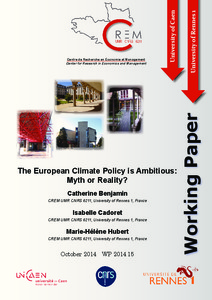The European climate policy is ambitious: myth or reality?
"We investigate the carbon emission trends among the Member States by testing the assumption of -type convergence for per capita CO2 emissions, conditional upon per capita output and energy use per capita. Our results reveal that: EU-15 countries switch to a less carbon intensive economy from t...
| Main Authors: | , , , |
|---|---|
| Institution: | ETUI-European Trade Union Institute |
| Format: | TEXT |
| Language: | English |
| Published: |
Rennes
2014
CREM UMR CNRS |
| Subjects: | |
| Online Access: | https://www.labourline.org/KENTIKA-19115789124919339619-The-european-climate-policy-is.htm |
| Summary: | "We investigate the carbon emission trends among the Member States by testing the assumption of -type convergence for per capita CO2 emissions, conditional upon per capita output and energy use per capita. Our results reveal that: EU-15 countries switch to a less carbon intensive economy from the early nineties, e-g, the relation emission growth/income is strictly negative. This result is robust to the inclusion of the new Member States. Thus, we argue that the decline in EU carbon emissions s a long term-trend and not the result of the economic crisis. Then, we discuss the eectiveness of the 20/20/20 climate package and the burden-sharing agreement. Some countries like Germany and Great-Britain can meet their carbon target without putting more eorts. Other historical Member States like France, Luxembourg, Sweden and Belgium can meet their carbon target by decreasing their energy use by 10%, ceteris paribus. Most of the New Member States can reach their target by increasing their energy per capita to the 1990 level while stabilizing their carbon emissions. This implies that their investment in renewable energy should be substantial." |
|---|---|
| Physical Description: | 30 p. Digital |

